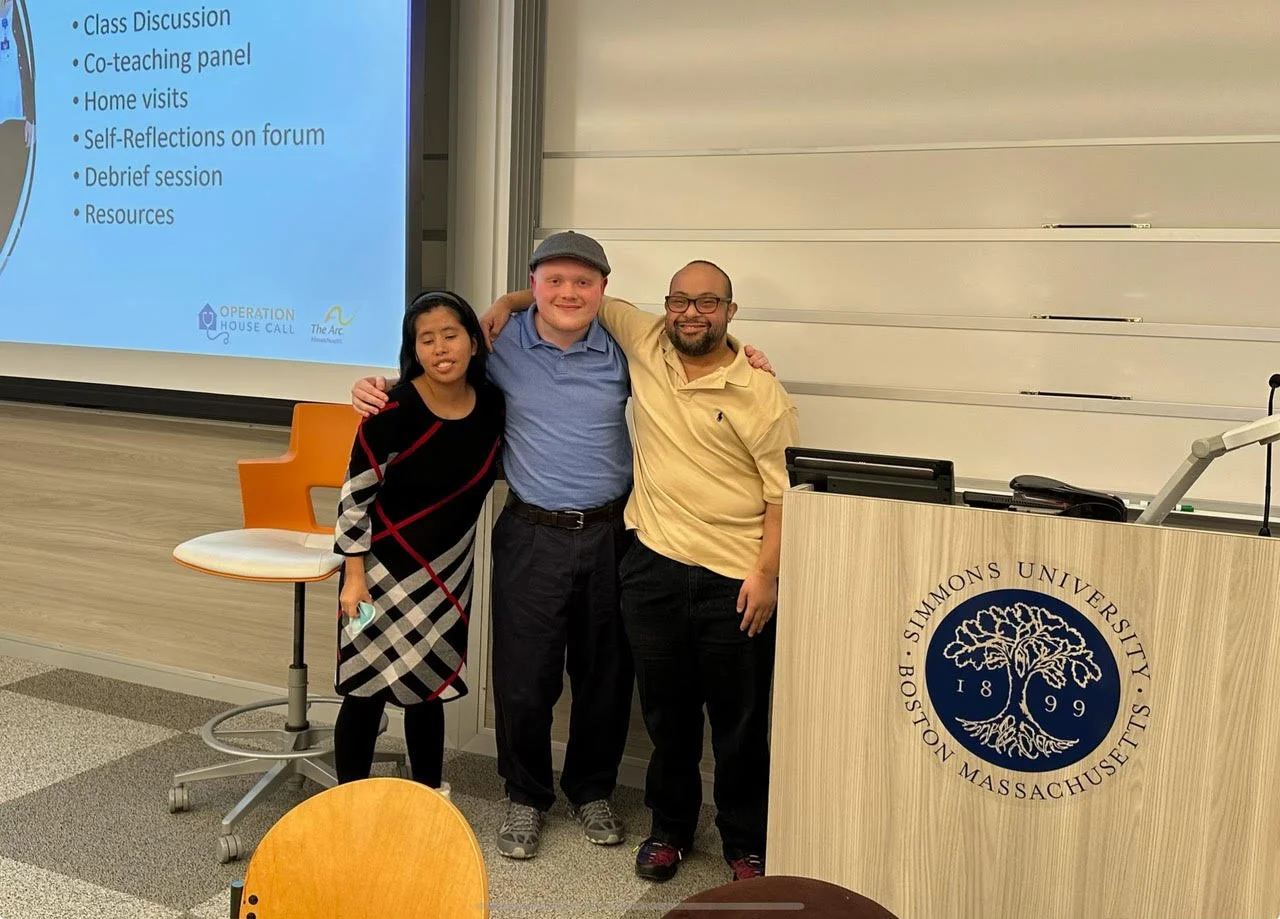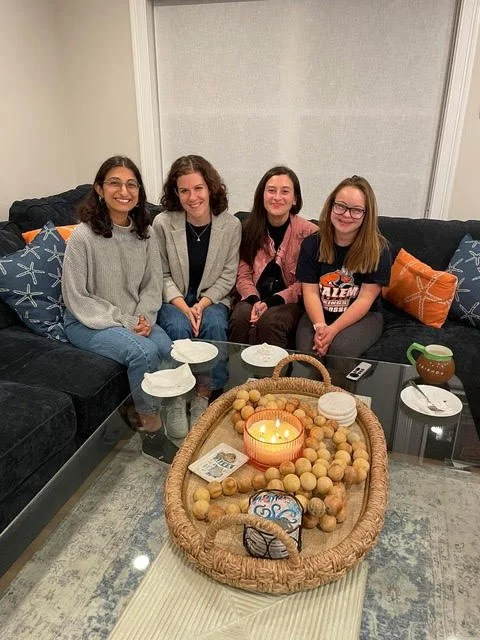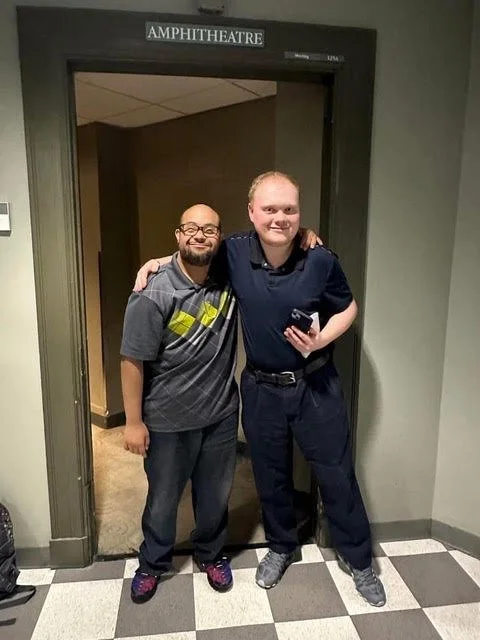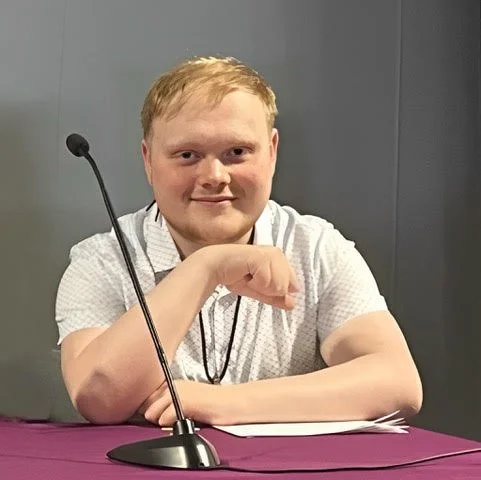You Can’t Learn to Swim on the Shore
Teaching Medical Students Based on Lived Experience with IDD and Autism
Mia, Jonathan and Isaiah (left to right) after a Q&A panel session at Simmons University
By Stephanie Lowell and Jonathan Gardner
The doctor-patient relationship is such an important component of the quality of the healthcare experience. And yet, in a survey of 714 US physicians, only 40% felt equipped to treat patients with autism and intellectual and developmental disabilities. Operation House Call (OHC), a program of the Arc of Massachusetts, partners with medical schools to help future doctors feel more confident and prepared to care for this population of patients.
OHC is an experiential learning program that teaches medical, nursing and allied health professional students the essential skills and mindsets to provide high quality care to individuals with autism and intellectual and developmental disabilities (IDD). A core aspect of our program is the unique opportunity for students to learn from the lived experience of individuals with IDD/autism and their families. In a classroom session, students hear from both parent instructors and from individuals with IDD/autism who, as co-teachers, share about their lives, including what helps them in the medical setting. After the class, students make “home visits” to the residences of the OHC network of volunteer host families, to learn about patients’ lives in a way that that textbooks or slide decks are unable to teach.
Samantha with a group of students during a home visit (Sam is on the far right of the picture)
Our co-teachers are at the heart of our impact. These individuals have diagnoses such as autism, IDD, Down syndrome, etc., and they teach to help students see them as so much more than their diagnoses. They talk about who they are, what their day to day lives are like, and what helps them most when they go to a medical appointment—sharing their thoughts through presentations and/or in a Q&A with the students. Students consistently tell us that the story-telling approach drives our impact and that hearing from our co-teachers is a highlight of the program.
OHC co-teachers bring so much to our program and gain valuable experience as well. Many of our co-teachers have been part of OHC as home visit hosts (alongside their families) and are excited by the opportunity to tell their story in the classroom setting. If they are interested in teaching, our co-teacher coordinator walks them through how it works (including the stipend to be received for each class they teach). They receive mentoring and practice their presentation with our lead OHC co-teacher and OHC Ambassador (and co-author of this article, Jonathan Gardner), who provides both concrete advice and moral support along the way.
Jonathan and Isaiah before a class at Harvard Medical School
We interviewed a small number of our amazing OHC co-teachers to ask them about who they are, why they teach, and what they’d like all future doctors to know. We sent questions ahead of time and gave our interviewees a choice of responding in writing or in a live interview with us. All four chose to preview the questions and then do the live interview, either solo or with the help of a support person. For one of the interviews, we worked with the co-teacher’s mother ahead of time to modify the questions and used a social story structure that included pictures and yes and no questions that we walked through during the interview.
Stephanie/Jonathan: Tell us a little about yourselves
Mia: I am funny, kind, and nice. I’m 29, and I went to the Riverview School on Cape Cod. I like playing games, Uno is my favorite. I have a Best Buddy. My favorite holiday is Christmas, Easter, Thanksgiving – I can’t pick just one!
Samantha: I am 23 years old. I live with my parents, and I have a separate apartment where I can be more independent and be who I like to be!
Isaiah: I work at Shake Shack. I’m nice and one of the people with highest survey results at Shake Shack. For fun I play Xbox, and hang out with family and friends.
Alden: (shared through yes/no questions): I like basements, playgrounds, making jokes and being helpful.
Steph/Jonathan: How did you find out about Operation House Call?
Isaiah: I found out about OHC when I was 14 from Maura Sullivan (CEO of the Arc of Massachusetts and longtime Director of Operation House Call). We did home visits and later I started to do some teaching too.
Samantha: My parents mentioned the opportunity to me and I thought “here’s an amazing opportunity to speak up for myself and for other people with disabilities.”
Alden: (shared through yes/no questions): My mom (who works at Operation House Call) asked me to try it.
Steph/Jonathan: What do you like most about teaching in the Operation House Call program?
Mia: I like seeing new faces and talking to all of the students and coming to their classroom. I like to help students get ready for working with people who have disabilities. I like being part of OHC because it’s helping create a healthcare system that listens, learns, and respects people of all abilities
Samantha: My favorite thing is learning from you, Jonathan. You teach me to be a better co-teacher and to get my teaching skills up to par. You helped me push my presentation and speech along and helped me to be more professional.
Alden: (shared through yes/no questions): I earn money.
Steph/Jonathan: What do you hope our medical students and nursing students learn from you when you teach?
Samantha: To treat people with kindness and respect. And not to be afraid of people who are different, they need to be able to take care of people like me and Jonathan. Because if they’re afraid, we’re afraid. I also want them to know I love who I am.
Alden: (shared through yes/no questions and Mom’s support): I had a chest cold cough and went to the minute clinic. I got the x-ray done independently. I like to play with fidgets at the doctor’s office.
Mia: I hope they learn how to help patients stay calm, and that they will listen to what I say and how I’m feeling. I might need extra time to understand when you explain things. I really want to understand what is going on with my body! I also tell students that it helps me when doctors make me laugh because it helps me feel calm and less anxiety.
Isaiah: Students ask me: how do you feel most comfortable in the doctor’s office? They ask me about my life and my history (Isaiah has had many surgeries over the years for medical complications often associated with Down syndrome). I used to be very anxious about doctors when I was younger, but not now, because I know what to expect. I hope they learn about how to communication with patients, how to make kids AND adults with disabilities be comfortable, and how to be right here, right now with me.
Steph/Jonathan: What have you learned by being part of OHC?
Isaiah: I’ve learned to be flexible, professional, and considerate. I learned how to tell my story. It makes me want to be even more involved as a self-advocate.
Mia: I learned to make a professional presentation. I practiced a lot at school and with Jonathan.
Alden: (shared through yes/no questions and mom’s support): I learned I can do hard things. Like talking to a group of people.
Steph/Jonathan: Anything else you’d like to share?
Samantha: I recently went to an adult care heart care doctor, because I have some heart issues going on. They were talking to my mom and my mom pointed them to talk to me. I wanted to say, “I’m an adult, talk to me!” Sometimes my mom does need to step in or explain something, and that’s ok, but it’s important that doctors talk straight to me.
Alden before class at UMass
Mia: I see a lot of doctors. I like when they explain things to me, and I like when they give me choices of how we do things. Also, when I did a heart ultrasound, my doctor told a joke, which made me laugh, and lightened the mood so I wasn’t afraid. This helps me trust them.
Isaiah: OHC has been one of my favorite things to do in my free time. I say (to other co-teachers) “Get out there, go get ‘em … the sky’s the limit.”
* * *
Authors: We are grateful to our incredible co-teachers for bringing their lived experience to the over 1,200 medical, nursing, and allied health professionals we reach each year!
About the Authors
Jonathan Gardner is a dedicated advocate for disability rights at both the state and national levels. A homeschool graduate, cancer survivor, and individual who happens to have autism, Jonathan serves as an Official Ambassador for Operation House Call through the Arc of Massachusetts, a Flutie Fellow for the Doug Flutie Jr. Foundation for Autism, Co-Chair of the Massachusetts Supported Decision-Making Coalition, and a board member of Massachusetts Advocates for Children. Jonathan believes, “As Human Beings, our differences enrich each other. Our voices together can be powerful and significant. We should all strive to create a world where everyone’s voice is heard, and every life is valued.”
Stephanie Lowell is the Director of Academic Programs and Partnerships for Operation House Call (OHC), a program of the Arc of Massachusetts, and serves as parent instructor in our medical school programs. Operation House Call partners with medical, nursing, and allied health professional schools to teach essential skills and mindsets needed to provide equitable and inclusive healthcare for patients with intellectual and developmental disabilities (IDD), including autism. In addition to her work with OHC, Stephanie has more than 20 years of experience as a trusted advisor to leaders across sectors on strategic and organizational priorities. Her younger son Andy is a sweet and resilient teenager with refractory epilepsy and IDD who has participated in OHC home visits for more than 10 years.






